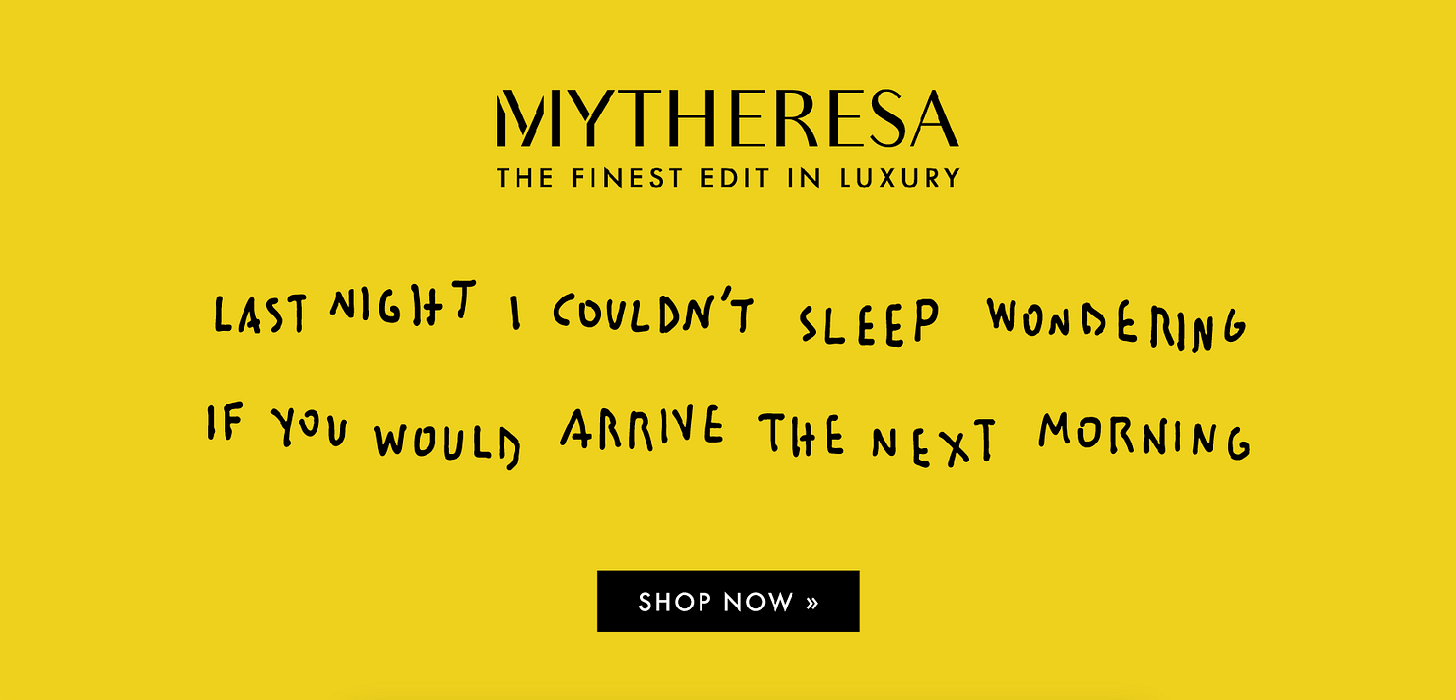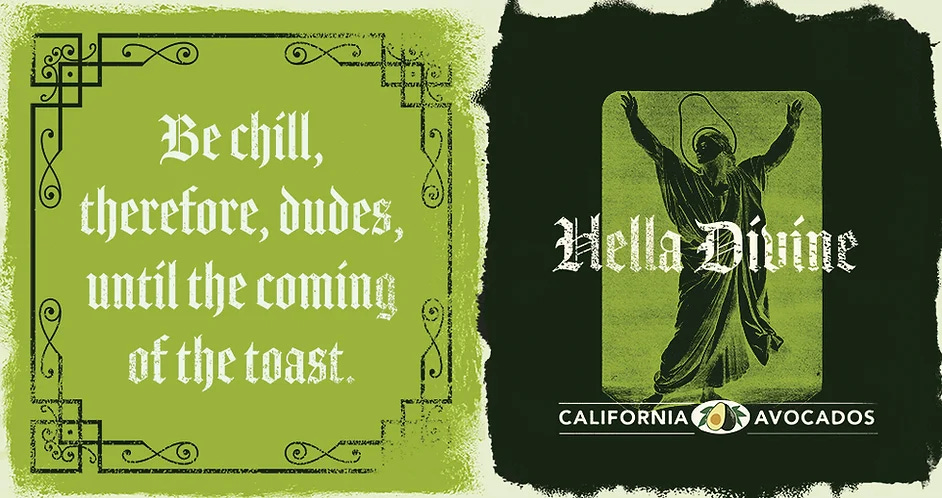The Pulse: May 2023
A poetic coronation, John Wick as a poem, the "poet laureate of puberty", and more
Hi! Ana here. I’m trialling out a monthly column that rounds up news, projects, and moments of interest related to poetry, (mostly) beyond the “world” of poetry. Poetry, IRL. In film, fashion, tech, culture, design, business, etc. In our lives. Because that’s where poetry lives. Like if you like it, and tell me what you think?

So how about that King Charles’s coronation? A poem to mark the occasion: An Unexpected Guest by Simon Armitage is now up on the official website of the Royal Family. See also: The poem James Nesbitt performed at the coronation concert, We’re Lighting Up the Nation. Stella McCartney also gave a spoken word performance at the coronation on the topic of conservation, a cause common between both the fashion designer and now-king. Safe to say it was a poetic event.
John Wick 4 is still in theatres. (This is the movie I was alluding to when I was writing Poetry Camp.) It’s great. The best time I’ve had at the theatre all year—though it was narrowly dethroned by Dungeons and Dragons a few weeks later. There’s a poem in the Paris Review called John Wick Is So Tired that’s been hitting people in the feels. And if you’re curious how a poem is written, here’s a behind the scenes look at the making of this poem.
As heard in Tetris, the Apple+ movie that came out in March: “It's poetry, art and math, all working in perfect synchronicity! It's the perfect game.”
A bookstore on a mountaintop in China has gone viral.
Poet slash lawyer Reginald Betts was just profiled in this slice of life piece in The New Yorker: The Poet Writing on Prison Underwear. Yes, it’s what it sounds like. And more.
The first book written in English by a person of African descent was a poetry book from the 1770s—and it just went up for auction.
Ever wonder what work looks like for a professional poet, and specifically for a poet laureate? Ada Limón’s stint as U.S. Poet Laureate was just renewed for a second term, and here’s a look at what that means and how one goes about the job to “raise the national consciousness to a greater appreciation of the reading and writing of poetry”. Coming soon: Ada’s poem, to be engraved on a spaceship, will be revealed on June 1. From the article:
“The first term has been an otherworldly experience,” she said. “Whether it was at the White House, the Palacio Nacional (in Mexico City) or composing poems in W.S. Merwin’s Maui home, it’s as if my life became amplified. The biggest thing I’m working on is making sure I don’t miss it. It’s easy to rush from one thing to the next or feel a sense of urgency that blocks out all delight. But I want to pay attention. I believe in paying attention, in noticing.”
Ada Limón is also mentioned in this excellent piece that I would like twice if I could, from PopPoetry: Why We Need More Poetry in Hospitals—and on Television.
I love seeing a book of poems in a hospital bed because that’s where they belong: in our lives as they are lived daily, not just on the moldering shelves of library basements, where students sometimes imagine that they live.
Speaking of poet laureates, Judy Blume, fresh off the recent release of her documentary, Judy Blume Forever and a film based off her beloved classic, Are You There God? It’s Me, Margaret. starring Rachel McAdams (with an astounding 99% audience rating on Rotten Tomatoes), is described as “the poet laureate of puberty” in this piece on The Atlantic. Now of course, Judy Blume is a novelist and not a poet, so it’s like a metaphor.
Aurielle Marie writes about Poems as World Building and Necessary.
Okay, but how about poetry readings in really cool spots? Like this medieval ghost town in Italy.
Fashion has been taking literary cues, as seen on the runway in March for Fall 2023 collections. Irish designer Róisín Pierce built her collection around women who had their work banned in the 20th century, including the poetry of Sylvia Plath and Edna O’Brien:
I started looking at Sylvia Plath’s work because I learned there was a Committee of Evil Literature and you weren’t allowed to access her work or things like Vogue, or authors like Kate O’Brien or Edna O’Brien, who are really significant writers. I was interested in the poem ‘Lady Lazarus’ where [Plath] speaks about being controlled and trying to take over her oppressor. She starts off quite weak and fragile and, by the end of it, has such strength — it’s like a resurrection within her. I wanted the looks, although they are quite soft, to have layers of strength. (Source)
And then Arch Hades, known as the world’s highest paid poet in 2021 when she sold one poem for just over half a million dollars (*to be fair, it was a multimedia poem in the form of a nearly ten-minute animation), recited an excerpt from her poem and book, Arcadia, at the Roksanda show.
A little late, but I had to sneak this one in: Dior’s menswear show back in January was inspired by T.S. Eliot’s poem, The Waste Land.
And over at Proenza Schouler, Chloë Sevigny recites a series of fictional journal entries that reads like prose poetry, written by novelist Ottessa Moshfegh—who, by the way, used to make money selling vintage tea dresses.
I don’t usually read ads because a quick skim is enough to tell me I don’t need to. Then I came across this on-page ad from luxury retailer Mytheresa, and I stopped. Short, poetic, and actually kind of fun, don’t you think?
Who knew you could find poetry in an online magazine about…shipping? I’m starting to think poetry lives everywhere.
ChatGPT is pretty bad at poetry, according to poets.
But maybe it’s good at telling time with poems.
The Pulitzer Prizes for 2023 have just been announced, and the winner for poetry goes to Then the War: And Selected Poems by Carl Phillips.
Getting lost in the world of restaurant menus: “Even as QR code technology threatens to render printed menus obsolete, it occurred to me that nothing can replace the texture and poetry of a physical menu.”
Why I adore the night by Jeanette Winterson, a textural treat and love letter for night owls who get that “Life is too short to be all daylight. Night is not less; it’s more”.
Calling all poets: Poetry Bulletin is the best list I've come across of opportunities for poets, and their May bulletin is live. Love that half of Substack paid subscription fees goes towards supporting poets. 💕
Found on TikTok: An account called Poet’s Society (@poetsocietyy) that doles out clips from films, theatre, and interviews not always related to poetry but akin to the idea of Carpe Diem-ing, a most poetic concept. And: There’s something poetic about…oranges? Juliet (@_happy_dagger_), whose Substack,
, just launched, shares a selection of poems.Also trending on TikTok: The Wes Anderson trend, in which people record clips of their lives and travels and present them with symmetry and a colour filter. And how perfectly timed: Landing next month by Wes Anderson, Asteroid City, a “science fiction romantic comedy-drama”. Related: Remember the poetry in 2014’s The Grand Budapest Hotel? It was all written by Wes Anderson himself, who said "This is a little pastiche. I just made them up. They don’t exist beyond that. None of them get very far." I love this interpretation from, of all sources, an edtech company:
These poems are clearly a mockery of poetry: they suggest that poetry is a useless way of speaking in a modern world. In fact, you probably noticed most of these poems ends with the recitation being interrupted. There is no time in the fast-paced world of (then) modern Zubrowka for the laments and exaltations of old.
At most, these poems are a form of expression that allows for the characters to connect with each other and brighten each other's lives, like Gustave does for Madame D. when he recites a poem about "gray medieval pines."
However, we have to mention that Agatha's poem—the final one in our list—does manage to reach its conclusion. This is probably because the poem that Agatha recites comes at the time when Zubrowka is officially at war. Prior to the start of the war, poetry was seen as a kind of frilly, outdated art form. However, now that war threatens to eradicate the history and culture of Zubrowka altogether, older art forms like poetry are seen as essential to cultural understanding.
This needs to change. On Reddit r/Poetry, someone asks for a “proper poem”. There are about a dozen responses. All of the poets mentioned are men, and I think all, if not most, are dead. (Note: When I came back to edit this post two days later, finally I saw, way down at the very bottom, Maya Angelou and Emily Dickinson. It’s a start, internet.)
At the Winning Gallery in Molesey, UK, a free exhibition showcasing sculptural poetry is on from May 30 to June 11.
New to poetry and want to try writing some with an intention to play? Giselle Buchanan’s 4-week multimedia creative writing workshop is starting in a few days, on May 21.
I absolutely ate up this interview with poet Maggie Millner in The Creative Independent, Kickstarter’s online publication on creative work. A couple of my favourite quotes:
I do fall into a trap, as a lot of people do, of treating even my free time as something to optimize or structure in a way that is maximally efficient—so I can have the most amount of fun or experience the highest degree of relaxation or see the biggest number of friends. I’m trying to get out of that framework.
Poetry is often working to arrest and manipulate time. I think that’s part of its joy: stopping the flow of life to allow for fine-grained observation, for sensory immersion, for endlessly recursive levels of analysis. It opens up a space in which to feel, but also a space in which to catch oneself in the act of feeling.
Loved this joint project by art director Hannah Berling (who studied creative writing for undergrad with a focus on poetry, no less) and copywriter Mackenzie Thomas that celebrates the California Avocado as “hella divine”, featuring a play on poetic verse instead of copy-copy.
New in poetic nonfiction: Everybody Come Alive, Sound Within Sound: A Radical History of Composers in the 20th Century, and Your Brain On Art. (Check out the website for that last one. Trust me. It’s a treat for the senses.)
And: Y2K is still going strong and in the flurry of camis, low-rise jeans, and Barbie pink, we have butterflies—perhaps a poetic ode to coming out of the physical and psychological cocoon of a worldwide pandemic. Hermann Hess’s collected writings on butterflies is being released this month in the book Butterflies: Reflections, Tales, and Verse featuring essays and poems all about butterflies. Take in a moment of literary wonder in The Paris Review with On Butterflies featuring an excerpt from the book to end this month’s roundup:
Everything we see is expression, all of nature an image, a language and vibrant hieroglyphic script.
This Week’s Poem Triptych
Because a poetry newsletter isn’t complete without a few poems. Here are three random selections I liked this week from across the wild wonderful web. Enjoy!
Blue by Carl Phillips
Read the whole poem: Poetry Foundation
Antisocial Media by Leah Mueller
Read the whole poem: Here at
Boomerang Valentine by Andrea Gibson,
From the collection: Lord of the Butterflies









What an incredible, inspiring list! Thanks so much for putting all this work in for us.
Thank you, Ana!!!! Loved this and it’s so necessary! Learning so much from Violets 📝